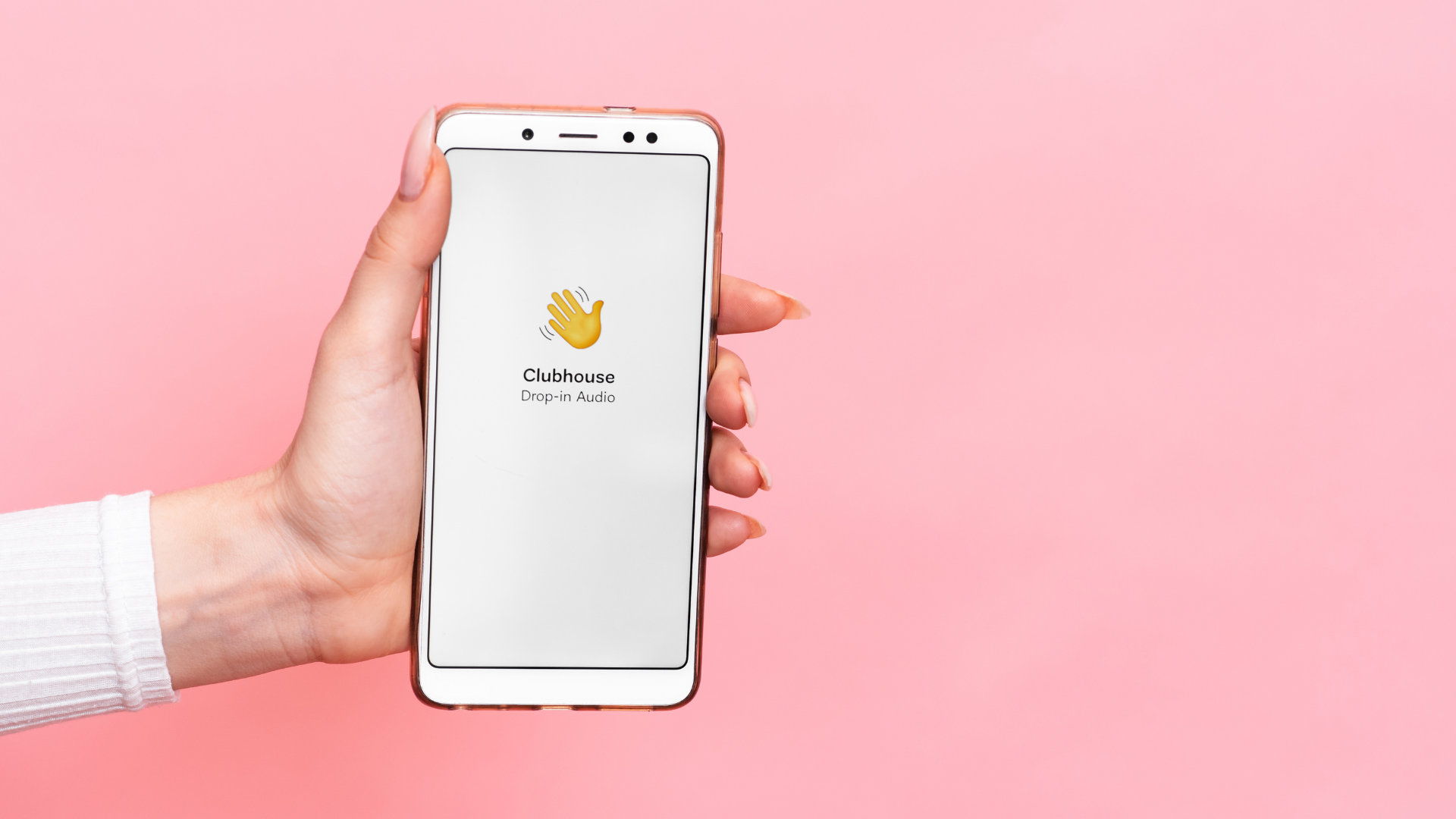In May 2020, Clubhouse, an audio-only social platform, had just 1,500 members. As of February 2021— less than a year later— there are more than 10 million people on the platform. Plus, it’s now valued at $1 billion, more than 180 organizations and venture capitalists have invested in it, and it’s ranked in the top five social networks in the Apple App Store.
Even in a world as social media saturated as ours, Clubhouse’s meteoric rise feels unprecedented. We’re here to catch you up to speed on all things Clubhouse: what it is, how it works, what makes it different, and who the key players are on the platform and to answer the question of “should event professionals pay attention to it?”
What is Clubhouse?
The way Clubhouse works goes a little something like this: people join pop-up audio chat rooms that disappear when the conversation comes to an end. When users join a chat room, moderators can segment them into various tiers which lay out their permissions. Clubhouse users are able to join any chat room, assuming it hasn’t reached the 5,000 listeners capacity. From there, you can see who is speaking or listening, and visit anyone’s profile page to follow others.
Another key characteristic is that so far, people have only been able to join the community on an invitation basis. In the same way that velvet ropes and signs reading “VIP section” can transform a random corner of a club into high-demand real estate, this invite-only system has drummed up even more excitement around the platform. There are even reports of people in China paying up to $61 for an invite code.
In recent days, security and privacy concerns have been raised about the Clubhouse app. As an early-stage platform, the founders are working to address and alleviate these concerns from their current and potential users.
Who created Clubhouse?
Clubhouse is the brainchild of Silicon Valley entrepreneur Paul Davison and ex-Google employee Rohan Seth. They launched the social platform on iOS in April 2020 and received about $12 million in funding from the capital firm Andreessen Horowitz in May 2020.
Davidson previously created the social networking app Highlight as well as a camera-roll sharing app called Shorts. He then went on to work for Pinterest when his creative team was acquired in 2016. Seth has worked as an engineer for Google and co-founded multiple businesses including app-building group Memry Labs and Lydian Accelerator, which conducts research into treatments for genetic conditions.
This dynamic duo has played it relatively low key in the press given the scale and scope of their success with Clubhouse. However, they’re likely to be leading voices in the startup and technology space for years to come.
Why is Clubhouse so hot right now?
The rollout of Clubhouse on iPhones exclusively is causing a great deal of buzz, however, it excludes a large population of Android phone users. The invite-only model has been compared to the early stage launches of now well-known social platforms, and this also creates a lot of mystery around the platform and who and how it is being used.
I asked Thom Singer— keynote speaker, author, podcaster, and host of the Speakernomics Podcast (sponsored by the National Speakers Association), and professional master of ceremonies— for his insight. He’s one of the many Clubhouse members finding ways to get the most out of the social platform, soaking up insights in various chatrooms and even hosting his own. From his first-hand experience in Clubhouse, he says the app is “putting the ‘social’ back in social media.”
“Not since the early days of Twitter has there been so much natural connecting in a social media app. I believe that since the pandemic, people have missed the serendipity of connections and conversations,” Singer said. “When interesting people come together, be it on site or online, the power of unique conversations will always happen. It is a great place to come and learn, listen, and sometimes share your own expertise.”
What sets Clubhouse apart?
Clubhouse cuts out the noise— ironic, for an audio-centric platform, we know. The lack of monetization has made advertising rare, instead shifting the focus to self-promotion and networking. Many take relationships started in Clubhouse rooms over to Twitter, LinkedIn, or Instagram, as the Clubhouse app does not have a text or DM feature yet, but its founders have shared that this is on their roadmap.
Scroll through Facebook or Twitter for five minutes, and— unless you’ve seriously purged your timeline— you’re bound to see everything from what someone had for breakfast, a shared post about a missing pet 1,000 miles away from you, and lots and lots of memes. There’s nothing inherently wrong with that kind of content, but on Clubhouse, you just won’t encounter it. This clears the way for a focus on constructive conversations between event professionals and celebrities but also casual talks free of any visual distractions.
Top speakers to follow on Clubhouse
Whether completely intentional or not, Clubhouse is totally living up to its name right now. It’s exclusive, with even a bit of mystique surrounding it. But crucially, the platform seems to be not only garnering attention and interest, but also living up to the hype for those who join the community. That’s thanks in large part to the talented speakers who have joined Clubhouse and been hosting engaging chats on all kinds of topics. Below are just a few of the most prominent speakers on the platform.
- 21 Savage: Rapper & Hip-Hop Recording Artist
- Jared Leto: Academy Award-Winning Actor Known for “Dallas Buyers Club,” “Requiem for a Dream” & “Suicide Squad;” Lead Singer for Band ’30 Seconds to Mars’
- Michael Ovitz: Co-Founder of CAA & Former President of The Walt Disney Company
- Ashton Kutcher: Actor, Producer, Investor & Activist
- Mark Cuban: Serial Entrepreneur, Investor & Owner of the Dallas Mavericks
- Daymond John: “Shark Tank” Investor; Founder & CEO of FUBU; Presidential Ambassador for Global Entrepreneurship
- Kevin O’Leary: Founder of O’Leary Financial Group; Venture Capitalist & Financial Expert; Known for Being A Shark on”Shark Tank”
- MC Hammer: Hip Hop Recording Artist, Record Producer & Entrepreneur
- Tiffany Haddish: Comedian, Actress, Dancer & Author; Best Known for “Girls Trip”
- Van Jones: CEO of REFORM Alliance, CNN host, Emmy Award-winning Producer & NY Times Best-Selling Author
- Bill Gates: Co-Founder of Microsoft; Co-Chair of the Bill & Melinda Gates Foundation
Is Clubhouse just a fad?
Josh Felser, co-founder of the venture firm Freestyle, said back in May 2020 that Clubhouse is “either dead by July or it’s something big.” By December 2020, the platform was at 600,000 downloads. Then 2 million by January 2021 before skyrocketing to over 10 million this month. The platform has thus far sustained a crazy amount of growth for almost a year. And it’s performed well outside of just sheer numbers, too.
Other media giants are taking notice of this success. Facebook is reportedly building an audio chat product that is similar to Clubhouse, and billionaire Mark Cuban is co-founding Fireside, a live-conversation app that allows users to record conversations.
While every new social platform has its bugs, Clubhouse has more than 609,000 ratings in the iOS App Store with an average rating of 4.77 stars. Does all of this make the platform worth the hype? That’s a question influenced by preference and one that each person can only answer for themselves. From our perspective, the question of “should event professionals pay attention to what’s happening on Clubhouse” has been answered— with a resounding “yes.”











